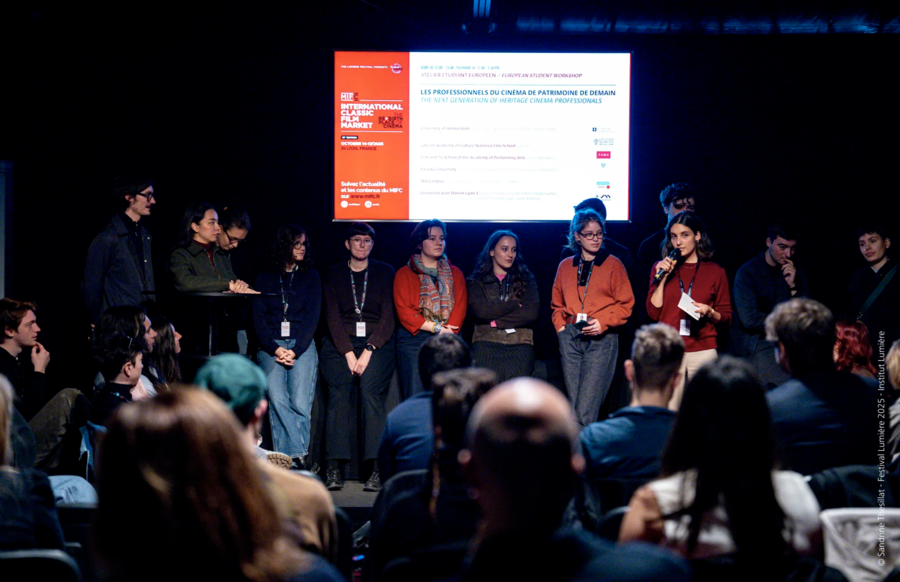European Student Workshop
On Thursday, October 16, several professionals and students from various European programs gathered for the first edition of the International Classic Film Market Student Workshop. The event was conceived in 2024 and brought to fruition in 2025 with the aim of bringing together heritage professionals and the next generation. The meeting took place in two parts, in an informal forum: the first part allowed the speakers to introduce themselves and talk about their careers, while in the second part, the students were able to present their programs. The students were also able to ask questions to the various speakers.

A diverse panel of professionals
For this first edition of the International Classic Film Market Student Workshop, five professionals were on hand to talk about their careers to the assembled students. This was an opportunity to highlight the diversity of career paths within the heritage film sector and to offer advice to the next generation. Manuel Alduy, Director of Cinema & Young Adults and Internationals Fictions at France Télévisions, advised the students to develop their personal tastes and love of cinema, but also to think about finding new ways to motivate channels and distributors to promote lesser-known works rather than what the public expects. Claire Brunel, co-director of the Wim Wenders Foundation, advised students to be curious and to acquire knowledge in several fields, without necessarily specializing. Anne-Laure Brénéol, co-director and co-founder of Malavida Films, encouraged students to make films to better understand their production, before proving to them, based on her own career, that it is possible to create something that is not available on the market (in this case, a company). Finally, Camille Chanod, editorialist and programmer for La Cinetek, and Eléonore Masson, director of acquisitions for the platform, urged students to take their first steps in small festivals in order to get to know people better and quickly gain responsibility, but also to make a name for themselves.
Courses focused on heritage
A total of six universities and courses were represented at this first edition of the Student Workshop. First up was the University of Amsterdam (Netherlands), represented by students from the Preservation and Presentation of the Moving Image (PMP) program. Launched in 2003, this program focuses on new trends in the restoration, conservation, selection, accessibility, and editorialization of audiovisual media. The curriculum is divided into a theoretical part and a practical part with an internship that can be international. Latvia was then represented by students from the Latvian Academy of Culture National Film School. At this university, students are very involved in the sector with direct and privileged access to the national archives, which they can handle, and collaborate with local filmmakers. Two delegations then presented two different schools in the Czech Republic: the Film and TV School of the Academy of Performing Arts, which teaches its students to cooperate, particularly by making films on negative, and Palacký University, where practice and theory are combined, with multiple career opportunities and a very broad education. In France, the INA Campus training program was presented by its 18th class, made up of work-study students. Working under the auspices of the INA, their teachers are professionals in the sector and their career opportunities are numerous in the audiovisual and traditional cinema industries. They receive technical courses on film and sound conservation, learn about documentation and digitization, and how to create inventories. This training program is run in partnership with numerous French institutions, combining the theoretical and practical aspects of the sector. Jean Moulin Lyon 3 University rounded off this workshop with two courses, one dedicated to multimedia design and screenwriting and the other dedicated to television and platforms. Combining theoretical and practical aspects, this training includes a professional component with a total of nine months of internships and access to professional equipment according to the students' needs. Meetings are organized with professionals from the film and audiovisual industry, and students form partnerships with various events, such as the International Classic Film Market.
Questions from the younger generation
Alongside their presentations, professionals and students had the opportunity to discuss topics raised by the younger generation. The importance of physical media was reaffirmed by the professionals present, who were asked how to compete with the digitization of audiovisual production. Anne-Laure Brénéol and Claire Brunel highlighted the importance of DVD and Blu-Ray releases, which allow viewers to contextualize the works and prolong the experience of watching a film, particularly with booklets containing bonus features or photographs. Camille Chanod and Eléonore Masson then added that platforms such as La Cinetek could support theatrical releases through their editorial work. La Cinetek was also the subject of a question, with students asking about its economic model and administrative functioning. Finally, the subject of cinema accessibility and pirating was addressed, leading the speakers to reaffirm the importance of editorial work in promoting the discoverability of works, without denying that illegal downloading exists and is widely popular. All that remains is to redirect the public toward legal avenues once it has developed a taste for cinema, playing in particular on its frustration.




